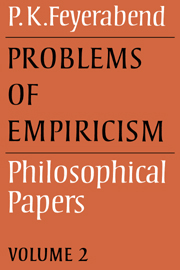Book contents
- Frontmatter
- Contents
- Introduction to volumes 1 and 2
- 1 Historical background
- 2 Classical empiricism
- 3 The structure of science
- 4 Two models of epistemic change
- 5 Philosophy of science versus scientific practice
- 6 Mach, Einstein and the Popperians
- 7 Wittgenstein's Philosophical Investigations
- 8 Consolations for the specialist
- 9 Popper's Objective Knowledge
- 10 The methodology of scientific research programmes
- 11 More clothes from the emperor's bargain basement
- Sources
- Name Index
- Subject Index
6 - Mach, Einstein and the Popperians
Published online by Cambridge University Press: 05 June 2012
- Frontmatter
- Contents
- Introduction to volumes 1 and 2
- 1 Historical background
- 2 Classical empiricism
- 3 The structure of science
- 4 Two models of epistemic change
- 5 Philosophy of science versus scientific practice
- 6 Mach, Einstein and the Popperians
- 7 Wittgenstein's Philosophical Investigations
- 8 Consolations for the specialist
- 9 Popper's Objective Knowledge
- 10 The methodology of scientific research programmes
- 11 More clothes from the emperor's bargain basement
- Sources
- Name Index
- Subject Index
Summary
1. In his paper ‘Mach, Einstein and Modern Science’ in Brit. J. Phil. Sci., 28 (1977), 195ff Elie Zahar states
A. that Einstein, when introducing special relativity, violated ‘cardinal’ principles of Mach's philosophy (205),
B. that without the violation ‘the special theory of relativity would never have seen the light of the day’ (195), and he infers
C. that Mach's philosophy ‘was largely irrelevant to the development of modern physics’ (195).
Now the fact that Einstein violated some ‘principles’ of Mach's philosophy does not show that his ideas were independent of other principles of that philosophy; nor does it show that the philosophy did not influence other parts of modern physics, such as the quantum theory: Zahar's arguments do not establish C.
2. They also fail to establish A.
Zahar mentions four conflicts between Mach's and Einstein's ideas and procedures. They are Al: relativity ‘is a causal theory in the traditional sense of the wor’ (203) i.e. a theory involving an asymmetry, whereas Mach's functional approach eliminates all asymmetries (202). A2: Einstein's definition of simultaneity violates ‘one of Mach's cardinal methodological principles’ (205) and it is also ‘radically different’ (203) from Mach's definition of mass. A3: the special theory of relativity uses inertial frames which, being unobservable, are anathema to Mach. ‘It is therefore small wonder’ writes Zahar on this point ‘that Mach should have disowned relativity’ (206). Inertial frames are also needed to make sense of general covariance hence Mach, when arguing for general covariance, ‘was violating a tenet of his own branch of positivism’ (212).
- Type
- Chapter
- Information
- Problems of EmpiricismPhilosophical Papers, pp. 89 - 98Publisher: Cambridge University PressPrint publication year: 1981
- 2
- Cited by

